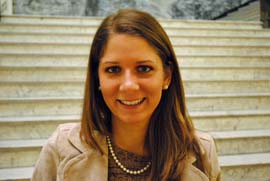Opportunity Knocked, This Drexel Senior Answered

There are two types of people in the world—people who have it and people who don’t. Nevena Bosnic, a senior economics major, has it. Whether the “it” is drive, talent or intellectual curiosity, Bosnic is a remarkable role model for students at Drexel.
When she’s not with her residents in Myers Hall or roaming around Pearlstein where she’s a member (and former president) of the Drexel Economics Society, or working in Greece on two different co-op experiences, Bosnic will soon be found in Washington, D.C., where she’ll spend a year working as a Carnegie Junior Fellow.
Bosnic was recently named a 2012-2013 Carnegie Junior Fellow in the International Economics program of the Carnegie Endowment for International Peace. She will spend the coming year working as a research assistant to the Director of the International Economics program. Bosnic is Drexel’s first student to ever receive this highly prestigious and very competitive award, where the acceptance rate lingers around 5 percent of all applicants.
Bosnic became interested in the European crisis as a Vidalakis Scholar in Crete, Greece during her co-op in the spring and summer of 2010.
“That’s when they had huge protests, demonstrations and strikes. Although it wasn’t personally affecting me, I was surrounded by it,” says Bosnic, a Northeast Philadelphia native. “I knew there was a global financial crisis, but I didn’t know how it was particularly hitting Greece.”
After returning to Philadelphia, Nevena pursued a research assistant position with Dr. Laincz of the Department of Economics and International Business, who exposed her to researching economics in the Eurozone. Her third and most recent co-op was with the U.S. Department of State in the Economic Section of the U.S. Embassy in Athens, Greece.
This experience paved the way for Bosnic to establish her career goal—to work on developing and implementing international economic policy.
“Eventually I want to contribute to formulation of global economic policy and this is the one place I can get a head start in understanding what it entails and how to go about making it into fruition,” says Bosnic. “When I looked into the Cargenie Endowment I realized how greatly aligned it is with my personal ideals and my ideal career persuit.”
Carnegie is a global thinktank that does research on a variety of topics including international economics.
“Their main vision is that increased international cooperation will eventually lead to greater peace so countries how cooperate are less likely to engage in conflict,” says Bosnic.
During her fellowship that begins August 1 in Washington, D.C., she will work within the International Economics program under a Carengie senior associate Dr. Uri Dadush. Dadush is a senior associate and Harvard graduate with experience working for the World Bank and the Economist.
“He’s a big deal. Just being exposed to this man alone and thinking about the power and influence he has in terms of global discussion and his contributions to global economic policy—it’s almost mind-boggling,” says Bosnic.
Her work with Dadush will run the gamut in terms of research in economics.
“The main thing that I’m looking forward to is that [the fellowship] doesn’t focus on one particular area. It’s so vast and will open my eyes to a lot of topics. Right now my interests are in the Eurozone but at the same time I haven’t been exposed to a lot of issues,” says Bosnic.
She is also the first Drexel student to ever be named a junior fellow and attributes this success largely to Drexel’s faculty.
“I can’t name a single professor in the economics department who has not provided me with any kind of support whether it’s acadmic support, moral support, or encouragement to folllow through with the fellowship application,” says Bosnic, who went up against applicants from many Ivy League students for one of the sought-after positions.
Each year, the Carnegie Endowment for International Peace offers 8 to 10 one-year fellowships to uniquely qualified graduating seniors and new graduates. They are selected from a pool of nominees from close to 400 participating colleges.
--Stephanie Takach
Drexel News is produced by
University Marketing and Communications.